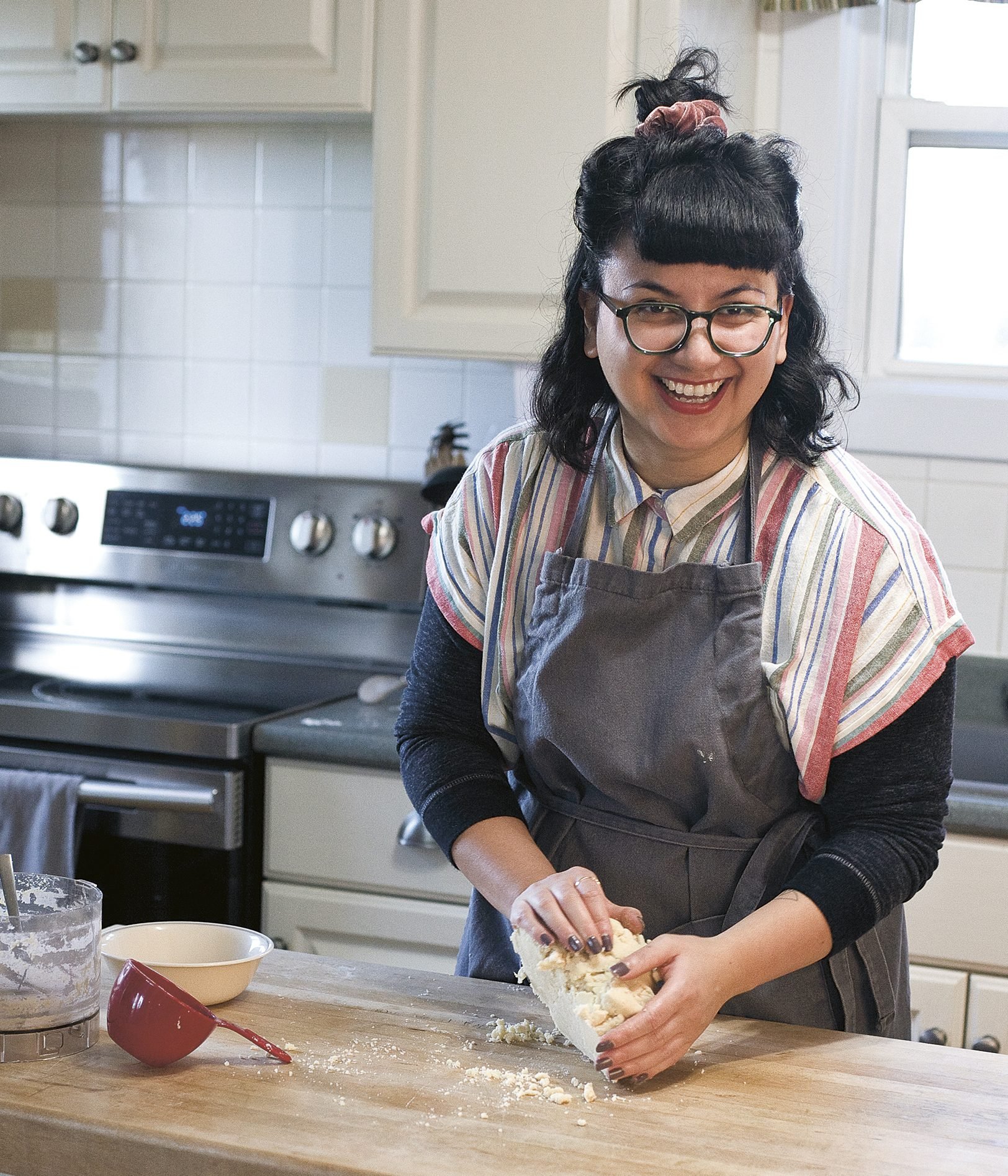10 Simple Secrets to Finding Your Happy Place
From cutting back on social media to helping others, these self-care ideas will help you find your happy place.

“I deliver food for a non-profit that cooks healthy meals for seniors, people in self-isolation or anyone in need. Making a small difference for others helps put things into perspective.” – Liz MacInnis, 40, Victoria
The pandemic has done a number on our morale. We’re worried about catching COVID-19 or losing someone to it. We may be trying to work with kids underfoot, risking our health at our job or suddenly unemployed. Then there’s the boredom and loneliness experienced by anyone who must stay home for extended periods of time. It’s no wonder that over half of Canadians report that their mental health has suffered since last March.
While we can’t change the circumstances, we can take active measures to feel better about ourselves. Here are 10 expert-approved strategies that’ll help you strengthen your resiliency—and find your happy place.
1. Cut back on Facebook
Since social-media platforms can bring approving attention from others, they can seem like good places to go for a pick-me-up, but they might actually bring you down. Most people portray themselves in a distortedly flattering way on these feeds, giving the impression they’re having more exciting lives than they truly are. “This can lead to faulty comparisons and doubts about your own lifestyle,” says Rob Whitley, a psychiatry professor at McGill University in Montreal. In some cases, he adds, it can even contribute to the onset of depression or anxiety.
Social media can also tempt you to make decisions based on how you hope other people will perceive you—going to scenic spots that don’t actually interest you, for example, or spending all your time baking loaves of bread just to post photos of them. Meanwhile, the activities that will provide a sense of real purpose and worth, such as cultivating good relationships, pursuing meaningful work, contributing to the community and learning new things, don’t always lend themselves to social-media sharing.
In a 2018 Centre for Addiction and Mental Health survey, Ontarians who reported spending two or more hours on social media every day were significantly more likely to say their mental health was “poor” or “fair,” compared to people who spent less or no time on these platforms.
Whitley recommends moderation. He also suggests deciding on times when you won’t log on to social media at all—such as when you’re at the dinner table or having a telephone conversation—so you can give the activities at hand the focus they deserve.
2. Do something you’re good at
Patrick Keelan, a Calgary-based psychologist, rehearses the piano every day. It’s one of the ways he practises what he preaches. When he’s helping someone who is experiencing low self-esteem, he suggests they routinely engage with activities that use or improve their skills. “When you’re doing something you’re good at or getting better at, it gets harder to think negatively about yourself,” he explains.
Psychologists even have a name for this inner conflict—cognitive dissonance—and it’s a spark that can lead to a positive shift in how you see yourself. “If you keep up with activities you’ve mastered, it’ll put pressure on your attitude toward yourself to adjust to match,” Keelan says. “Something has to give.”
In other words, you shouldn’t wait until you’re feeling confident to brush up your chess game, learn to build furniture or try out a new recipe. Quite the opposite: just applying yourself to pursuits you find both interesting and challenging could, on its own, help to improve your self-perception.
3. Embrace balanced thinking
People who are experiencing low self-esteem tend to be plagued by “hot thoughts” (distressingly negative ideas) about themselves. “Their minds do the reverse of what a press secretary would do for a politician: they spin things in a negative direction,” Keelan explains.
He encourages you to move toward “balanced thinking,” which shouldn’t be confused with trying to put a blindly positive spin on everything—despite what some self-help books tend to promote. Instead, it’s about considering the evidence for and against your self-critical thoughts.
“Typically, when you examine it, a hot thought is either not completely true or not true at all,” says Keelan. For example, suppose a friend stops calling you. If you find yourself thinking, “I’m not a lovable person,” you could look at whether that’s the most logical conclusion. It’s far more probable that you need to talk something through with your friend, that they’re busy and distracted or that you’re simply drifting apart because your lives are going in different directions.
Cognitive behavioural therapy (CBT), which is widely available both in person and online, can help with what Keelan calls the three Cs: catching, checking and changing unhelpful thoughts. A 2018 Psychiatry Research review found that even attending a one-day CBT workshop focused on self-esteem can make a small but meaningful difference.
4. Accept compliments
People struggling with their self-image often have trouble believing positive feedback because it doesn’t jibe with how they see themselves. But even though it may feel uncomfortable, going through the motions of accepting a compliment is an easy place to start when setting out to improve your outlook on life.
“It’s straightforward: all you have to do is say thank you,” says Keelan. Much like doing the things you’re good at, thanking instead of deflecting someone for a kind word triggers cognitive dissonance, which might ultimately change your attitude.

“I’m a widower, and I’ve been writing about my wife’s life in Budapest during the Second World War. Keeping my mind busy means I don’t have time to ruminate over all the what-ifs.” – Glenn Lettau, 83, Toronto
5. Respect your body
Only nine per cent of Canadian women and 13 per cent of men are completely satisfied with their physical appearance, according to market research. A lot of influences can leave us feeling down about our bodies, including the judgment of family members and peers and the narrow range of body types celebrated in media and advertising.
Besides resisting these influences as much as possible, it’s also helpful to remember that there’s a lot more to your body than what it looks like. “We spend a lot of time living in our bodies as objects—things to be seen and evaluated by other people,” says British Columbia counsellor Amy Green. She believes it’s important to focus on what you’re able to do with your body: plant a garden, create art, hug your pet or anything else that brings you purpose or enjoyment.
Green is a proponent of a concept called positive embodiment, which encompasses all the ways we can experience and love our bodies. “We’re good at living in our heads,” she says. “So it’s important to take time in the day to just notice your body. It could be as simple as pausing to take a deep breath, wiggling your fingers or feeling your feet on the floor.”
She also emphasizes the benefits of caring for yourself: “Do this in a way that’s not about fitting a particular appearance, but that’s instead about your physical health and your sense of connection to your body,” she says. This includes mindful eating (paying attention to bodily sensations such as hunger, fullness and the smells and flavours of foods) and mindful exercise (being attentive to the sensations of physical activity).
Some disciplines, such as yoga, include a built-in mindfulness component, but just about any activity could be approached in this way. For instance, if you go out for a walk, pay attention to the cadence of your steps and the wind on your skin.
6. Reminisce
Getting older often brings changes that can threaten your sense of who you are—the loss of loved ones, professional identity or independence, for example. It should come as no surprise, then, that self-esteem tends to peak at around age 60 and then declines.
If you’re an older person with a lot of life experience, you could benefit from telling someone stories from your past. In a 2015 study from Iran, a therapist encouraged a group of widowed men to share memories of the personal and historic events that had shaped their lives, as well as the life lessons they’d picked up along the way. The researchers reported that this “promoted a sense of identity and a positive contribution to the next generation and reaffirmed the meaning of [the subjects’] lives.”
Of course, anyone of any age can take a trip down memory lane by looking through a photo album with someone or playing music that reminds you of meaningful moments.

“After losing my job, I started baking cakes with flavours from my Iranian-Filipina heritage. It’s a pick-me-up for myself, but I also get a boost from giving them away to friends and acquaintances.” – Mahalia Golnosh Tahririha, 28, Montreal
7. Practise self-compassion
Studies have linked self-compassion to self-acceptance, as well as resilience in difficult circumstances. Of course, being charitable to yourself is easier said than done, and people are often their worst critics. You might worry that offering yourself the same kindness you’d give to a good friend would mean giving up on self-improvement and personal responsibility. But in fact, research shows that self-compassion actually makes those things easier because it allows you to face your flaws and learn from your mistakes.
To practise self-compassion, first make yourself aware of your harsh self-talk while trying not to pass judgment on it. “For example, you could just matter-of-factly notice something like, My inner critic thinks I’m overweight right now,” says Toronto psychotherapist Diviya Lewis. (Remember that you’re not conceding that your inner critic is right.)
After that, you can acknowledge your suffering with kindness and remind yourself that imperfection and feelings of inadequacy are an inevitable part of the shared human experience.
As you’re doing this, you still might try to change in ways that could make you happier, healthier or more accomplished, but you’ll do so because you want to thrive, not because you’re deficient as you are. And when you mess up—which is bound to happen—you’ll be able to carry on trying your best instead of beating yourself up.
Just that thing happened in a University of Texas at Austin study of students who’d received disappointing grades on a mid-term exam: self-compassionate participants were more likely to remain interested in the course and its topic in spite of this setback.
8. Get moving
There’s no such thing as a cure-all, but exercise is the closest thing we have. Not only is it good for stress management and general mental health, it also provides a sense of competence and accomplishment.
Over the years, dozens of studies have indicated that exercise has a significant impact on physical self-worth and other self-perceptions, such as body image. For instance, a German study of seniors found that their body self-concept improved after a 14-week exercise program consisting of stretches, moderate-intensity aerobic activities and exercises for improving strength and coordination.
The activity you choose matters less than enjoying it, sticking to it and being challenged. Going to the gym may not be an option right now, but outdoor activities are still accessible, as is doing strength training at home (with or without equipment).

“At least once a week, we drive to a nearby conservation area for a family hike. Out there, we’re grateful to be able to take a deep breath without worry and connect with the outdoors.” – Ariel Brewster, 37, Toronto
9. Seek support
Sometimes aiming for self improvement by itself is not the most effective approach, especially if you’re facing other serious psychological challenges. By way of analogy, imagine doing stretches every day for back pain but continuing to walk around with a heavy boulder on your back. Lightening your load first would make it easier to get lasting results.
Professional help is always available for ongoing problems that can feed a negative attitude toward yourself, such as trauma, abuse, chronic pain, financial stress or marital breakdown. If you don’t know where to start looking, try dialing 211. Available in most of Canada, this free service aims to help people find the health and social services they need.
10. Help others (and accept their help)
Studies of people volunteering and performing acts of kindness suggest that caring is linked to high self-esteem. In fact, helping people and feeling good about yourself appear to promote each other in a virtuous cycle.
There are exceptions, such as cases when your attempts to help don’t actually bring good results, or when they come at the expense of meeting your own needs. But generally speaking, it’s good for your mental well-being to do something kind—perhaps calling someone who might be feeling isolated or offering assistance to overwhelmed parents. And, in turn, if you’re the one who’s struggling, let others get that same boost by helping you.
Next, check out these tips that will help you live to 100!






